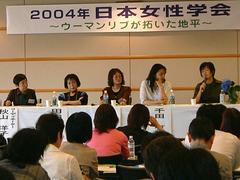 On the 12th and 13th of June, 2004, I was in Kurayoshi, TOTTORI, to attend the conference of the Women's Association of Japan for the first time. It was held in a beautiful hall, built by some designer, in a historic town of Kurayoshi. As was the hall itself, the atmosphere of the conference was very warm and welcoming. Though I was the first-timer, they accepted me as if I were a member from long ago, and I felt at ease immediately. This warm hospitality was maintained throughout the venue. Speakers were given encouraging opinions and proper suggestions from the audience. The message was clear: we go forward together, helping one another.
On the 12th and 13th of June, 2004, I was in Kurayoshi, TOTTORI, to attend the conference of the Women's Association of Japan for the first time. It was held in a beautiful hall, built by some designer, in a historic town of Kurayoshi. As was the hall itself, the atmosphere of the conference was very warm and welcoming. Though I was the first-timer, they accepted me as if I were a member from long ago, and I felt at ease immediately. This warm hospitality was maintained throughout the venue. Speakers were given encouraging opinions and proper suggestions from the audience. The message was clear: we go forward together, helping one another.
02. From Japan: April 2005 Archives
The Law for the Prevention of Spousal Violation and the Protection of Victims was amended in May 2004. It will be enforced in this December. The major changes are as below: (1) the extension of the period of Vacation Orders from 2 weeks to 2 months, which the court orders to the assailant, (2) the inclusion of children to the protection by the prohibition against approaching a victim, (3) determining the promotion of the victims become self-reliance under the responsibilities pf local government, and (4) the inclusion of mental violence to the definition of domestic violence, which used to refer only to physical violence.
The official announcement made in July, 2004, reported that the average number of times a woman give birth during her lifetime fell to a new record low of 1.29. As far as I remember, the term “1.53 shock” was all over the newspapers in the beginning of 1990’s, and the intellectuals were literally very shocked that they could not even hide their disappointment:“now the declination of Japanese population is undoubted.” It is to my surprise that almost nothing had done by taking advantage of “useful women’s opinion” against such serious social problem of human reproduction in more than a decade since then. Certainly, it is a matter of congratulation that making choice of not to have any children has been becoming approvable in society. However, here I dear to focus on the circumstance that makes women who are “interested in having one or more children” feel “they cannot” in spite of their thoughts.
Following the establishment of the Japan Society for Gender Law last year, a new movement has also arisen in the field of Economics. On the global level, the International Association For Feminist Economics (IAFFE) was established in 1992. Through this association, many issues are being debated, such as the structural change in socio-economic systems, the effects of policies on women, globalization, and the economics of caring. I can still remember my excitement as I read about the activities and research conducted by the IAFFE, in Yoshiko Kuba’s Economics and Gender: New Development of Feminist Economics. I was thrilled and realized, “This is where the economics for me will be created.”